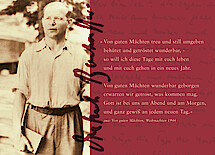Decoding Hope in Despair: Exploring Dietrich Bonhoeffer’s “Von Guten Mächten”
Dietrich Bonhoeffer, a German Lutheran pastor and theologian, penned his poignant poem “Von Guten Mächten” (“By Gracious Powers”) during his imprisonment for his involvement in a plot to assassinate Adolf Hitler. Written in the face of unimaginable suffering and certain death, this powerful prayer offers profound solace and resilience. It’s a testament to faith, hope, and the enduring presence of good in the darkest of times. Understanding the poem requires delving into its historical context, its theological underpinnings, and its enduring message of hope. This article will explore Bonhoeffer’s prayer, breaking down its core themes and offering insights into its lasting impact.
The Historical Context: Imprisonment and Resistance
To truly appreciate “Von Guten Mächten,” it’s crucial to understand the circumstances under which it was written. Bonhoeffer was imprisoned in Tegel Prison in Berlin, facing execution for his participation in the July 20, 1944 plot to kill Hitler. This act of resistance stemmed from his unwavering commitment to Christian values and his opposition to the Nazi regime’s atrocities. Knowing he faced imminent death, Bonhoeffer penned this prayer, a final testament to his faith and a farewell message to his loved ones.
Unpacking the Prayer: Key Themes and Meanings
“Von Guten Mächten” is not simply a lament; it’s a declaration of faith and a plea for strength. The poem is structured around several key themes, each offering a different facet of Bonhoeffer’s spiritual fortitude.
- The Presence of “Good Powers”: The poem’s central theme is the belief in the presence of “good powers” or “gracious powers” that surround and protect individuals, even in the face of suffering and death. This suggests a divine presence that offers comfort, strength, and guidance.
- Trust and Surrender: Bonhoeffer expresses a deep trust in God’s will, acknowledging his vulnerability and surrendering to a higher power. This act of surrender is not passive; it’s an active choice to embrace faith amidst despair.
- Hope Beyond Suffering: The prayer offers a message of hope that transcends earthly suffering. It suggests that even in the darkest moments, there is a promise of a brighter future, a reunion with loved ones, and the ultimate triumph of good over evil.
- Gratitude and Remembrance: While facing death, Bonhoeffer expresses gratitude for the blessings in his life and remembers the people he loves. This act of remembrance highlights the importance of human connection and the enduring power of love.
Analyzing the Structure and Language
Bonhoeffer’s poem is characterized by its simple yet profound language. The use of direct and earnest language, like “By gracious powers wonderfully sheltered,” emphasizes the sincerity of his prayer. The poem’s structure, often described as a series of verses, each presenting a different facet of his spiritual struggle and hope, allows for a gradual exploration of his emotional and theological landscape. The repetitive use of “Von Guten Mächten” at the beginning of each stanza reinforces the central theme and creates a sense of rhythm and emphasis.
The Enduring Legacy of “Von Guten Mächten”
“Von Guten Mächten” has resonated with people across generations and cultures. Its message of hope, resilience, and unwavering faith in the face of adversity continues to inspire and comfort. The poem’s universality lies in its ability to speak to the human condition, offering solace in times of personal hardship, societal unrest, and global crises. It serves as a reminder that even in the darkest of times, hope and faith can prevail. Bonhoeffer’s words continue to be a source of strength for those grappling with their own challenges, offering a powerful reminder of the enduring presence of “good powers” in the world.
How “Von Guten Mächten” is Applied Today
- Comfort in Grief: The poem is frequently read at funerals and memorial services, providing comfort to those who are grieving.
- Inspiration for Activism: Bonhoeffer’s resistance against the Nazi regime and his unwavering faith inspire individuals to stand up against injustice.
- Spiritual Reflection: The poem is used in personal reflection and meditation, prompting individuals to examine their own faith and beliefs.
- Artistic Expression: “Von Guten Mächten” has been set to music, translated into numerous languages, and adapted into various forms of art.
Frequently Asked Questions (FAQs)
1. What does “Von Guten Mächten” literally mean?
“Von Guten Mächten” translates to “By Good Powers” or “By Gracious Powers.” This immediately establishes the central theme of the poem, which is a reliance on divine protection and guidance.
2. Why is Bonhoeffer’s poem so famous?
The poem’s fame stems from its powerful message of hope and faith written in the face of certain death. It offers solace to those struggling with suffering and serves as a testament to the enduring power of the human spirit.
3. How did Bonhoeffer write the poem?
Bonhoeffer wrote the poem while imprisoned in Tegel Prison in Berlin. He was awaiting execution for his involvement in the plot to assassinate Hitler.
4. What is the significance of the poem’s structure?
The structure, typically divided into stanzas, allows Bonhoeffer to explore different facets of his faith and emotions. The repetition of the opening phrase reinforces the central theme and creates a sense of rhythm and emphasis.
5. How can I apply the message of “Von Guten Mächten” to my own life?
The poem’s message can be applied by cultivating faith, finding strength in difficult times, practicing gratitude, and remembering the importance of human connection. It encourages finding hope even in the darkest moments.
Conclusion
Dietrich Bonhoeffer’s “Von Guten Mächten” is a timeless testament to the power of faith, hope, and resilience. Written in the face of unimaginable suffering, the poem offers profound comfort and inspiration to those grappling with adversity. By understanding its historical context, key themes, and enduring legacy, we can gain a deeper appreciation for its message and find strength in its words. Bonhoeffer’s prayer serves as a powerful reminder that even in the darkest of times, the “good powers” are present, offering solace, guidance, and the promise of a brighter future.



